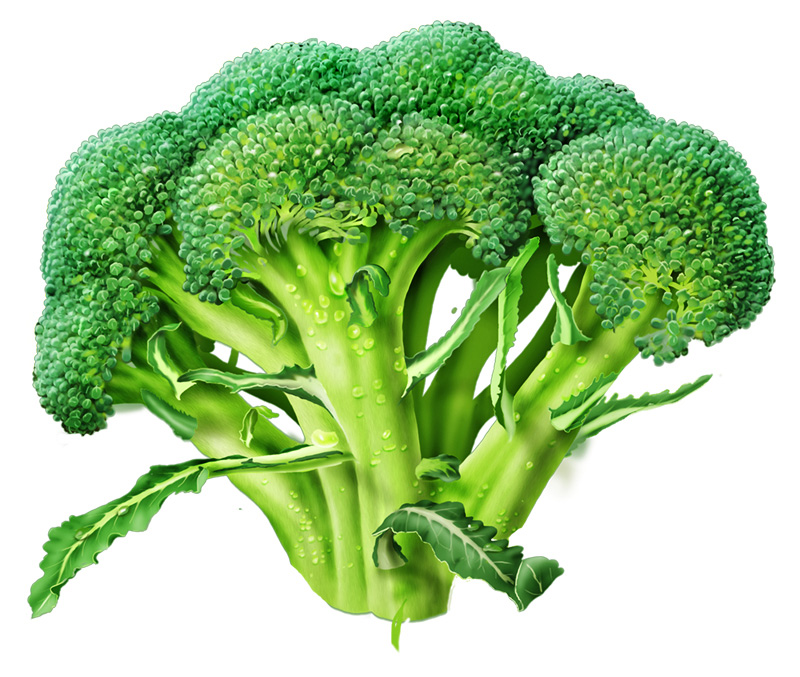 The unique combination of antioxidant, anti-inflammatory, and pro-detoxification components in broccoli make it a unique food in terms of cancer prevention. Connections between cancer development and oxidative stress, chronic inflammation, and inadequate detoxification are so well-documented in the research that any food improving all three of these metabolic problems would be highly likely to lower our risk of cancer. In the case of broccoli, the research is strongest in showing decreased risk of prostate cancer, colon cancer, breast cancer, bladder cancer, and ovarian cancer. We expect that risk of other cancer types will also eventually be shown to undergo reduction from regular consumption of broccoli. Recent studies have also provided us with a much better idea about the amount of broccoli that we need to lower our cancer risk, it looks like an average of 1/2 cup of broccoli per day. Studies show that more broccoli might be needed to accomplish other cancer-preventing tasks.
The unique combination of antioxidant, anti-inflammatory, and pro-detoxification components in broccoli make it a unique food in terms of cancer prevention. Connections between cancer development and oxidative stress, chronic inflammation, and inadequate detoxification are so well-documented in the research that any food improving all three of these metabolic problems would be highly likely to lower our risk of cancer. In the case of broccoli, the research is strongest in showing decreased risk of prostate cancer, colon cancer, breast cancer, bladder cancer, and ovarian cancer. We expect that risk of other cancer types will also eventually be shown to undergo reduction from regular consumption of broccoli. Recent studies have also provided us with a much better idea about the amount of broccoli that we need to lower our cancer risk, it looks like an average of 1/2 cup of broccoli per day. Studies show that more broccoli might be needed to accomplish other cancer-preventing tasks.
Cardiovascular Support
Although research in this area is still in the early stages, anti-inflammatory substances found in cruciferous vegetables are becoming the topic of increasing interest with respect to heart disease. One particular focus here involves the anti-inflammatory properties of sulforaphane, one of the isothiocyanates (ITCs) derived from the glucoraphanin in broccoli. In some individuals susceptible to high blood sugar, sulforaphane may be able to prevent (or even reverse) some of the damage to blood vessel linings that can be cause by chronic blood sugar problems. Decreased risk of heart attacks and strokes may also eventually be linked in a statistically significant way to intake of broccoli and its glucoraphanin.
A second area you can count on broccoli for cardiovascular support involves its cholesterol-lowering ability. Our liver uses cholesterol as a basic building block to produce bile acids. Bile acids are specialized molecules that aid in the digestion and absorption of fat through a process called emulsification. These molecules are typically stored in fluid form in our gall bladder, and when we eat a fat-containing meal, they get released into the intestine where they help ready the fat for interaction with enzymes. When we eat broccoli, fiber-related nutrients in this cruciferous vegetable bind together with some of the bile acids in the intestine in such a way that they simply stay inside the intestine and pass out of our body in a bowel movement, rather than getting absorbed along with the fat they have emulsified. When this happens, our liver needs to replace the lost bile acids by drawing upon our existing supply of cholesterol, and as a result, our cholesterol level drops down. Broccoli provides us with this cholesterol-lowering benefit whether it is raw or cooked. However, a recent study has shown that the cholesterol-lowering ability of raw broccoli improves significantly when it is steamed. In fact, when the cholesterol-lowering ability of steamed broccoli was compared with the cholesterol-lowering ability of the prescription drug cholestyramine (a medication that is taken for the purpose of lowering cholesterol), broccoli bound 33% as many bile acids (based on a standard of comparison involving total dietary fiber).
The B-complex vitamins in broccoli can also make a major contribution to our cardiovascular health. Especially with respect to excessive formation of homocysteine, an event which raises our risk of atherosclerosis, stroke, and heart attack, B-complex vitamin deficiency intake can pose a major risk. Three B vitamins especially important for lowering our risk of hyperhomocysteinemia (excessive formation of homocysteine) are vitamin B6, vitamin B12, and folate. By making an important contribution to our B6 and folate intake, broccoli can help us lower our risk of excessive homocysteine formation and cardiovascular problems that are related to excess homocysteine.
Health Benefits Provided by Broccoli
Three other areas of health benefits are important to mention when considering broccoli and its unique combination of nutrients. The first area is eye health. Two carotenoids found in significant concentrations in broccoli, lutein and zeaxanthin, play an especially important role in the health of the eye. In fact, no tissue in the body is more concentrated with lutein than the area in the outer portion of the retina (called the peripheral retina). Similarly, in the macula near the central portion of the retina, zeaxanthin is uniquely concentrated. Risk of problems involving the macula of the eye (for example, macular degeneration) and problems involving the lens area of the eye (for example, cataracts) have both been show to lessen with intake of foods (including broccoli) that provide significant amounts of the lutein and zeaxanthin carotenonids.
Dr. Tonifelix C. Manu
(PHYTOTHERAPIST)
